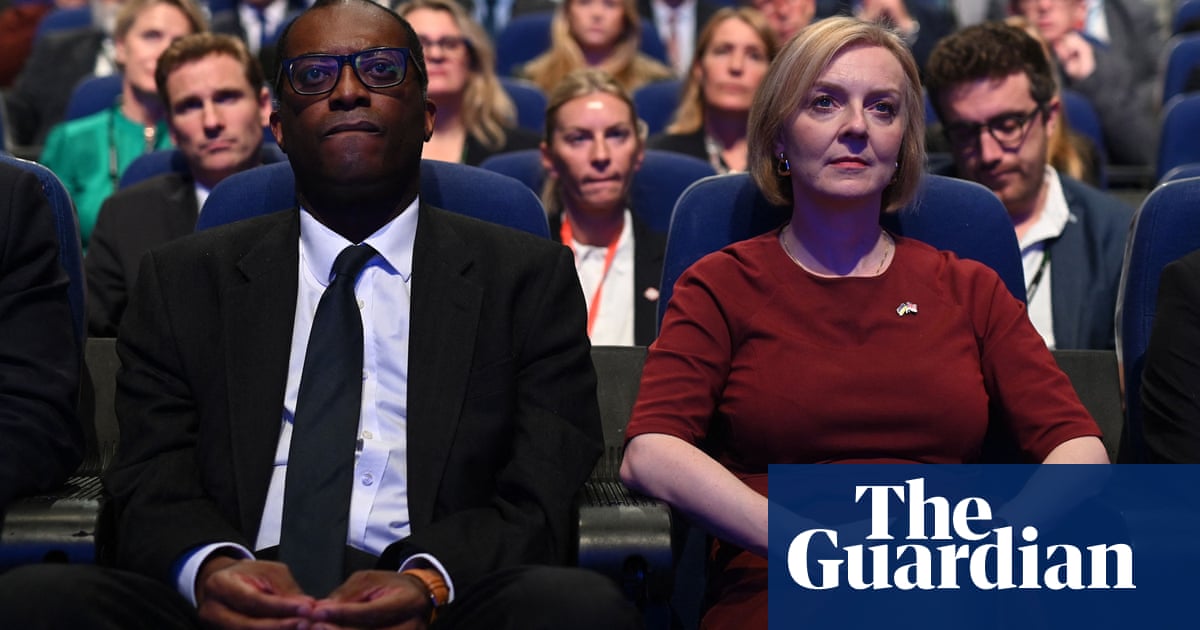
Kwasi Kwarteng, the chancellor of the exchequer for 43 of Liz Truss’s 49 days as British prime minister, has said Truss “essentially” sacked him “on Twitter”, a dismissal he called “kind of Trumpian” in its swiftness and brutality as Britain fell into crisis.
Kwarteng said: “One of the things that I feel bad about, among other things, was that she capitulated very quickly [to pressure to sack him]. So I came back and I was sacked, essentially on Twitter. So, kind of Trumpian.”
Kwarteng and Truss were close political allies and friends who entered parliament together in 2010, rose as ministers under successive Conservative prime ministers then took power after Boris Johnson was forced out.
Truss became prime minister on 6 September 2022. She installed Kwarteng at the Treasury, only to fire him little more than a month later, on 14 October, amid a financial crisis stoked by the “mini-budget” the two introduced.
Truss did not issue a tweet announcing Kwarteng’s firing before telling him – as Trump famously did to subordinates while US president – but Kwarteng nonetheless learned of his dismissal from a journalist’s post.
Kwarteng described events to One Decision, a podcast co-hosted by Sir Richard Dearlove, a former head of MI6, the British Secret Intelligence Service, and the reporter Julia Macfarlane.
It happened as Kwarteng rushed back to the UK from an International Monetary Fund meeting in Washington.
“I was due back on the Saturday morning,” he said, “and I came back on the Friday morning and I was driven to Downing Street and I was essentially sacked.
“But on the way to Downing Street, I could see on Twitter, I think it was Steve Swinford of the [London] Times had said … ‘The chancellor, Kwasi Kwarteng, sacked’ [or] ‘was sacked’ or ‘has been sacked’, I don’t know what tense it was. But the message was clear.”
Kwarteng’s subsequent meeting with Truss was “definitive”, he said, with no sense the prime minister might change her mind. Their friendship is widely reported not to have survived.
Kwarteng said he was “surprised because it was obvious to me that once I’d been sacked, it was over for her. So I was sort of slightly incredulous. I was thinking to myself: ‘You have just destroyed your premiership. There’s no coming back.’”
Kwarteng said: “I think I said to her or maybe a [special adviser] afterwards, that she had about three weeks … and of course I was wrong. It was six days.”
Truss resigned on 20 October.
In his One Decision interview, Kwarteng repeated admissions of mistakes made with Truss, mostly regarding the speed at which they attempted to introduce their economic plans, which centred on tax cuts and spending increases, thereby panicking the markets.
He insisted, however, that he and Truss were right to say the British economy was in need of stringent measures.
Truss has made similar statements, including in a widely panned new book, Ten Years To Save the West, in which she revealed how Queen Elizabeth II advised her to “pace yourself”, advice given two days before the monarch died.
Kwarteng said Truss had “admitted that was the right advice. But of course, hindsight is a beautiful thing. And we pushed ahead, and we all made mistakes, and we’ve got to be honest about that”.
Kwarteng’s description of his firing as “Trumpian” may cause comment, given Truss’s high-profile attempt to carve out a profile on the far right of US politics, amid Trump’s third presidential campaign.
Kwarteng will leave parliament at the next election, which must happen this year. The Sunak government is struggling in the polls, widely expected to lose power to Labour. But Kwarteng had a warning for the prime minister about a threat from his right.
Saying he would not have removed the whip from Lee Anderson, the former Conservative party vice-chair who made allegedly Islamophobic comments about the London mayor, Sadiq Khan, Kwarteng said Anderson’s new party, the hard-right Reform UK, presented a threat to Sunak.
“I think they’re a big problem,” Kwarteng said, though he said he did not think Reform would win seats at Westminster, given Britain’s lack of proportional representation.
Kwarteng said: “All over the western world, you’ve got centre-right parties that are quite vulnerable to more rightwing parties … on questions of identity, on immigration and also other social issues.
“We [the Conservatives] were in the kind of low 20s when I left office, and when Liz Trust left office, and we’re in the low 20s today. And the reason why we don’t seem to have made any progress in those 18 months, I think, can be explained very considerably by this phenomenon, this Reform party.”












